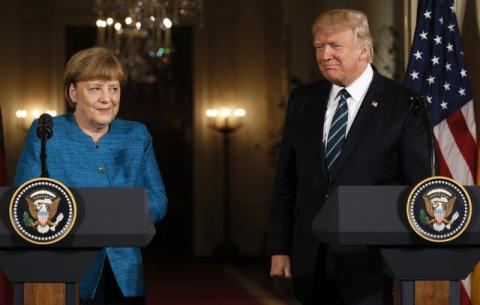Advertisement
In first Trump-Merkel meeting, awkward body language and a quip
WASHINGTON (Reuters) - The first face-to-face meeting between U.S. President Donald Trump and German Chancellor Angela Merkel started awkwardly on Friday and ended even more oddly, with a quip by Trump about wiretapping that left the German leader visibly bewildered.
The two leaders share different views on trade, Russia and immigration, leading to some uncomfortable moments at a joint news conference on Friday in which they took pains to downplay differences that were hard to mask.
Friday's meeting was the first between the new U.S. president and the long-serving stateswoman, who leads Europe's largest economy. It was seen as one that could help determine the future of the transatlantic alliance and shape their working relationship.
Though Merkel appeared relaxed, the body language between them was not especially warm.
Trump and Merkel shook hands when she arrived at the White House but did not do so in the Oval Office where she frequently leaned towards him while he stared straight ahead, sitting with his legs apart and hands together. In the Oval Office both leaders described their meeting in brief remarks to reporters as having been very good.
She began her remarks at the news conference by saying it was better to speak to each other than about each other.
"We held a conversation where we were trying to address also those areas where we disagree, but we tried to bring people together ... (and) tried to find a compromise that is good for both sides," Merkel said.
They shook hands again at the end of the press conference and then exited the East Room together.
Near the start of the news conference, Trump pressed Merkel for Germany to meet NATO's military spending target, and Merkel reiterated her country's commitment to the 2 percent military spending goal.
"I reiterated to Chancellor Merkel my strong support for NATO as well as the need for our NATO allies to pay their fair share for the cost of defense. Many nations owe vast sums of money from past years, and it is very unfair to the United States. These nations must pay what they owe."
Trump also stood by unproven claims that the Obama administration tapped his phones, and expressed solidarity with a surprised Merkel, whose government charged Washington in 2013 may have been spying on her.
“As far as wiretapping, I guess, by this past administration, at least we have something in common perhaps,” Trump said to Merkel, who looked bewildered as she stared back at him from her podium.
In 2013 the German government said it had information that the United States may have monitored Merkel's mobile phone, prompting her to call Obama to demand immediate clarification.
The Republican and Democratic leaders of the U.S. Senate Intelligence Committee issued a statement on Thursday rejecting Trump's assertion that the Obama administration conducted surveillance on him.
IMMIGRATION DIFFERENCES
Trump, who as a presidential candidate had criticized Merkel for allowing hundreds of thousands of refugees into Germany, said immigration was a privilege, not a right.
Merkel hinted at differences, saying: "This is obviously something we had an exchange of views about."
The new U.S. president has sought through executive orders to ban people from six Muslim-majority countries temporarily from entering the United States, causing an uproar domestically and internationally among critics.
Aside from business and foreign policy goals, relationship building was an important if less overt agenda item.
Merkel had close relations with Trump's Democratic and Republican predecessors, Obama and George W. Bush, and she is likely to seek a strong working relationship with Trump despite major policy differences and wariness in Germany about the former New York businessman.
"Those who know the chancellor know that she has a knack for winning over people in personal discussions. I am sure that Donald Trump will not be immune," said Juergen Hardt, a conservative lawmaker who helps coordinate transatlantic relations for the German government.
The two also discussed Ukraine and Afghanistan.
Trump said he expected the United States to do "fantastically well" in trade with Germany, while Merkel said she hoped the United States and the European Union could resume discussions on a trade agreement. Trump said he did not believe in isolationism but that trade policy should be fairer.
Before the news conference, Trump and Merkel held a meeting with business leaders from the United States and Germany at the White House.
(Additional reporting by Noah Barkin in Berlin, and Emily Stephenson and Susan Heavey in Washington; Editing by Yara Bayoumy and James Dalgleish)



















Add new comment